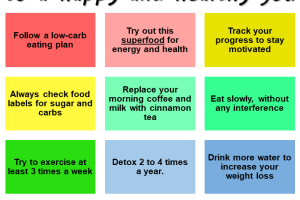10 Essential Tips for a Healthier Lifestyle

Embarking on a journey towards a healthier lifestyle can feel overwhelming at first. Many individuals struggle with knowing where to start and how to maintain momentum. It’s crucial to understand that achieving wellness doesn’t happen overnight; it requires a consistent and dedicated approach.
- 10 Essential Tips for a Healthier Lifestyle
- The Importance of a Healthy Lifestyle
- Setting Realistic Goals
- The SMART Approach to Goal Setting
- Eating a Balanced Diet
- Portion Control
- Incorporating More Fruits and Vegetables
- Staying Hydrated
- The Importance of Water
- Tips for Staying Hydrated
- Regular Exercise Routine
- Cardiovascular Activities
- Strength Training
- Prioritizing Sleep
- The Importance of Sleep
- Tips for Better Sleep Quality
- Managing Stress Levels
- The Impact of Stress on Health
- Practical Stress Management Techniques
- Limiting Alcohol Consumption
- The Effects of Excessive Alcohol Intake
- Tips to Reduce Alcohol Intake
- Avoiding Tobacco and Nicotine Products
- The Detrimental Effects of Tobacco Use
- Strategies for Avoiding Tobacco and Nicotine Products
- Socializing and Building Supportive Relationships
- The Role of Relationships in Well-Being
- Tips for Building Supportive Relationships
The Importance of a Healthy Lifestyle
Adopting a healthier lifestyle can lead to numerous benefits, including:
- Increased energy levels
- Improved mental clarity
- Enhanced mood stability
- Reduced risk of chronic diseases
Consider Jane, a busy professional, who decided to prioritize her health. By setting small, achievable goals, she felt motivated and empowered to keep pushing forward. For her, a balanced routine made all the difference, transforming not just her body but her entire outlook on life. As we explore the essential components of a healthier lifestyle, each section will provide practical tips and insights that can be easily implemented. Let’s dive in and discover how to create a balanced approach that works for you!
Setting Realistic Goals
Once you’ve acknowledged the importance of adopting a healthier lifestyle, it’s time to focus on setting realistic goals. Many people tend to dive in headfirst, only to feel discouraged when they don’t see immediate results. By creating achievable targets, you’ll build a solid foundation for long-term success.
The SMART Approach to Goal Setting
One effective way to set goals is through the SMART criteria, which stands for Specific, Measurable, Achievable, Relevant, and Time-bound. Here’s how it works:
- Specific: Define exactly what you want to accomplish.
- Measurable: Establish criteria to track your progress.
- Achievable: Ensure your goal is realistic based on your resources and time.
- Relevant: Align your goals with your overall health objectives.
- Time-bound: Set a deadline to foster accountability.
For instance, instead of simply saying, “I want to eat healthier,” you might set a goal like, “I will include two servings of vegetables in my meals for the next month.” This clarity helps foster commitment and allows you to celebrate small victories along the way, just like Jane did when she began incorporating more fruits and vegetables into her diet.
Eating a Balanced Diet
With realistic goals in place, the next step on your journey to a healthier lifestyle is focusing on eating a balanced diet. This doesn’t mean you have to completely overhaul your meals; rather, it’s about making thoughtful choices that nourish your body.
Portion Control
One of the fundamental aspects of healthy eating is practicing portion control. It can be easy to consume more than needed, especially when indulging in favorite dishes. Here are some tips to help with portion management:
- Use smaller plates: This simple trick can visually trick you into thinking you’re eating more.
- Measure servings: Familiarize yourself with healthy serving sizes.
- Listen to your body: Stop eating when you feel satisfied, not stuffed.
Imagine Tom, who used to load his plates at dinner. By becoming more conscious of his portions, he found it easier to enjoy his meals while also managing his weight.
Incorporating More Fruits and Vegetables
Boosting your intake of fruits and vegetables is another key factor in achieving a balanced diet. Aim to fill half your plate with colorful produce. Here are some ideas to make it easier:
- Snack on fruits: Keep fresh fruits accessible for a quick snack.
- Add veggies to meals: Try tossing spinach into smoothies or adding peppers to pasta dishes.
- Explore new recipes: Experiment with different fruits and veggies to find new favorites.
By incorporating more fruits and vegetables, you’re not only enhancing your meals but also supporting your overall health. Just like Jane discovered, adding variety can make healthy eating enjoyable.
Staying Hydrated
Now that you’ve made strides in your dietary habits, let’s talk about another crucial element of a healthy lifestyle: staying hydrated. Often overlooked, proper hydration plays a vital role in your well-being, affecting everything from energy levels to digestion.
The Importance of Water
Water is essential for various bodily functions, including:
- Regulating body temperature
- Supporting digestion
- Maintaining joint health
- Boosting energy levels
Consider Sarah, who realized she often mistook thirst for hunger. After committing to drink more water throughout the day, she noticed an uptick in her energy and focus.
Tips for Staying Hydrated
To ensure you’re getting enough water, try these easy tips:
- Carry a reusable water bottle: Keep it with you to remind yourself to drink.
- Set reminders: Use your phone or an app to prompt you to hydrate regularly.
- Infuse water with flavor: Add slices of lemon, cucumber, or mint for a refreshing twist.
By prioritizing hydration, you’ll not only support your health goals but also feel better overall. It’s a simple yet powerful choice that amplifies every effort you make on your journey to wellness!
Regular Exercise Routine
With hydration in check, it’s time to incorporate a regular exercise routine into your healthy lifestyle. Staying active is crucial not only for managing weight but also for boosting mental health and overall well-being.
Cardiovascular Activities
Cardiovascular exercises, such as running, cycling, and swimming, elevate your heart rate and improve your endurance. Here are some effective cardio options:
- Walking or Jogging: Simple yet effective, it’s a great way to start.
- Group Classes: Join a Zumba or spin class for motivation.
- Dancing: Turn on your favorite tunes and get moving at home!
For instance, Mike gradually shifted from occasional walks to jogging three times a week, which significantly improved his stamina and mood.
Strength Training
Strength training is equally important, as it builds muscle, boosts metabolism, and strengthens bones. Consider these practices:
- Bodyweight Exercises: Start with push-ups, squats, and lunges.
- Resistance Bands: Incorporate bands for light sessions at home.
- Weight Lifting: Gradually include dumbbells or kettlebells as you progress.
Let’s not forget Emma, who found strength training empowered her, both physically and mentally. Mixing cardio and strength exercises creates a balanced routine, ensuring comprehensive fitness. Now, it’s your turn to find what activities you love and help you stay fit!
Prioritizing Sleep
After establishing a consistent exercise routine, it’s essential to recognize the vital role sleep plays in achieving a healthier lifestyle. Quality rest is often the unsung hero behind everything from managing stress to enhancing physical performance.
The Importance of Sleep
Sleep is crucial for several reasons:
- Physical recovery: It’s when your muscles repair and grow stronger.
- Mental clarity: Good sleep helps improve focus and cognitive function.
- Emotional regulation: Adequate rest can help stabilize mood and reduce stress.
Consider Laura, who used to burn the midnight oil, believing she could squeeze more productivity from fewer hours of sleep. Once she prioritized rest, she felt more energetic and focused during the day, making her workouts and daily tasks much easier.
Tips for Better Sleep Quality
To enhance your sleep, try these simple strategies:
- Establish a routine: Go to bed and wake up at the same time every day.
- Create a sleep-friendly environment: Keep your bedroom dark, quiet, and cool.
- Limit screen time: Reduce exposure to electronics at least an hour before bed.
By prioritizing sleep, you’re bolstering your overall health, ultimately supporting all the hard work you put into nutrition, hydration, and exercise. Quality sleep is a game-changer on your journey!
Managing Stress Levels
As you continue to prioritize sleep, the next step in your wellness journey is managing stress levels. Life can be hectic, and stress is often an unavoidable part of the equation. However, how we manage that stress can have a profound impact on our health and overall quality of life.
The Impact of Stress on Health
Chronic stress can lead to various health issues, including:
- Increased anxiety and depression
- Weight gain or loss
- Sleep disturbances
- Weakened immune system
Take a moment to reflect on Alex, who juggled a demanding job and family responsibilities. He noticed that his stress was manifesting in fatigue and unhealthy eating habits. By acknowledging his stressors, he took proactive measures to manage them effectively.
Practical Stress Management Techniques
Here are some practical techniques to reduce stress:
- Practice mindfulness: Techniques like meditation or deep-breathing exercises can ground you.
- Engage in hobbies: Spend time doing what you love, whether it’s reading, painting, or gardening.
- Connect with others: Talking to friends or family can help provide support and perspective.
Incorporating these strategies into your daily routine can significantly lower stress levels and create a more balanced life. Remember, managing stress goes hand-in-hand with your efforts in nutrition, exercise, and sleep.
Limiting Alcohol Consumption
Having acknowledged the significance of managing stress, another crucial aspect of a healthier lifestyle is limiting alcohol consumption. While enjoying a drink occasionally can be part of social interactions, excessive or frequent drinking can undermine your health goals and overall well-being.
The Effects of Excessive Alcohol Intake
Overindulging in alcohol can lead to various negative consequences, including:
- Weight gain: Alcoholic drinks often contain empty calories.
- Sleep disruption: Even with a nightcap, alcohol can compromise the quality of your sleep.
- Increased anxiety: After the effects wear off, you might feel more stressed or anxious.
Let’s consider Mark, who used to unwind with a few beers every evening. He noticed that his energy levels plummeted and his workouts suffered. By cutting back on alcohol, he found he had more stamina and clarity during the day.
Tips to Reduce Alcohol Intake
Here are some effective strategies to limit your alcohol consumption:
- Set a limit: Decide in advance how many drinks you’ll have and stick to it.
- Choose non-alcoholic alternatives: Explore sparkling waters or herbal teas.
- Be mindful of triggers: Pay attention to situations or emotions that lead to drinking and find healthier coping mechanisms.
By making conscious choices about alcohol, you can support your health and enhance the positive strides you’ve made in your journey towards a balanced lifestyle.
Avoiding Tobacco and Nicotine Products
Following your journey of managing stress and moderating alcohol intake, it’s essential to address the issue of tobacco and nicotine products. Avoiding these substances is vital for maintaining long-term health and achieving a balanced lifestyle.
The Detrimental Effects of Tobacco Use
Using tobacco and nicotine can have significant adverse effects on your health, including:
- Increased risk of chronic diseases: Tobacco contributes to heart disease, lung cancer, and respiratory issues.
- Reduced physical performance: Nicotine affects lung capacity and endurance.
- Diminished mental clarity: Withdrawal symptoms can impair focus and concentration.
Take Lisa’s story, for instance. After years of smoking, she decided to quit and noted that not only did her energy levels soar, but she also experienced a clearer mind and improved workout performance.
Strategies for Avoiding Tobacco and Nicotine Products
Here are some practical strategies to help you steer clear of these harmful substances:
- Seek support: Join a support group or talk to friends and family about your decision.
- Find alternatives: Engage in healthier habits like exercising or chewing sugar-free gum when cravings arise.
- Educate yourself: Understand the risks associated with tobacco use to reinforce your commitment to abstaining.
By avoiding tobacco and nicotine products, you’ll not only enhance your physical well-being but also support your overall journey toward a healthier, more fulfilling life. This choice complements your efforts in nutrition, exercise, and stress management, paving the way for lasting positive change.
Socializing and Building Supportive Relationships
As you continue your path to a healthier lifestyle by avoiding tobacco and maintaining a balanced approach to alcohol, don’t underestimate the power of social connections. Building supportive relationships and engaging in social activities can significantly enhance your emotional well-being and motivation.
The Role of Relationships in Well-Being
Strong social ties can lead to numerous benefits, such as:
- Increased happiness: Spending time with loved ones boosts your mood and reduces feelings of loneliness.
- Enhanced motivation: Having supportive friends can inspire you to stick to your health goals.
- Better coping: Sharing your challenges with others can help you navigate difficult times.
For instance, consider Rachel, who joined a local fitness group. Not only did she find workout buddies, but she also developed friendships that encouraged her to stay active and focused on her health journey.
Tips for Building Supportive Relationships
Here are some strategies to help nurture positive connections:
- Engage in community activities: Join clubs, teams, or local groups that align with your interests.
- Prioritize quality time: Schedule regular meet-ups with friends and family.
- Be open and authentic: Share your health journey, aspirations, and struggles to foster deeper connections.
By socializing and building supportive relationships, you create a network that uplifts and motivates you, enriching your health journey and overall quality of life. As you continue to invest in these connections, you’ll find that they play a critical role in your overall success and happiness.





